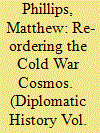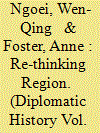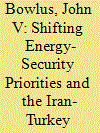|
|
|
Sort Order |
|
|
|
Items / Page
|
|
|
|
|
|
|
| Srl | Item |
| 1 |
ID:
179078


|
|
|
|
|
| Summary/Abstract |
magazine in February 1941 he was “dismayed” to find breezy photojournalism suddenly give way to five pages of solid text.1 He had perhaps just skimmed an article on a shoe fair in Chicago or glanced at an ad for Virginia, a “punch-packed love story of the new North and the modern South.”2 And now he was confronted by “The American Century,” an extended editorial by Life publisher Henry R. Luce. Luce’s closely-argued text repurposed well-worn tropes of American exceptionalism—including calls to “manifest” duty and an internationalism “of the people, by the people and for the people”—to urge the United States to plunge into the war then raging in Europe, to assert its rightful place as world leader, and to remake the world order in its own image.3 As Clarkson read on his initial dismay quickly turned to “delight,” and he was left wondering how many other “imaginations” had been similarly “inflamed” by Luce’s intoxicating vision.
|
|
|
|
|
|
|
|
|
|
|
|
|
|
|
|
| 2 |
ID:
179079


|
|
|
|
|
| Summary/Abstract |
Following the onset of war against the United States in spring 1965, the leadership of the Democratic Republic of Vietnam (DRVN, or North Vietnam) in Hanoi launched a so-called diplomatic struggle with two core objectives. The first was securing maximal military, economic, and financial aid from allies to sustain its war machine and mitigate the adverse effects of U.S. bombings on the northern economy. The second objective consisted of rallying world, including U.S., opinion against “U.S. imperialist aggression” in Vietnam with a view to “isolating” Washington decision-makers. In the face of mounting international and domestic criticism, DRVN leaders reasoned, the administration of U.S. President Lyndon Johnson would have to limit or end its intervention, including bombings of the North.
|
|
|
|
|
|
|
|
|
|
|
|
|
|
|
|
| 3 |
ID:
179077


|
|
|
| 4 |
ID:
179076


|
|
|
|
|
| Summary/Abstract |
In 1983 a reporter from the Far Eastern Economic Review visited a Balinese headman, inspecting a long row of tiny new homes recently built for himself and one hundred other families from his village. This was not Bali, however, but a new town carved out of the forest in the sparsely populated Luwu district of South Sulawesi, Indonesia, where nearly 43,000 people had moved from Java and Bali since 1970. These villagers were participants in Indonesia’s transmigration program, which between 1972 and 1990 resettled nearly five million people, mostly poor, landless farmers, from the densely populated islands of Java and Bali to more than 3,000 new settlements in Southern Sumatra, Aceh, Kalimantan, West Papua, Sulawesi, East Timor, and other parts of Indonesia. Jakarta spent nearly $10 billion in the process, reshaping the lives of millions of ordinary Indonesians on both ends of the migration chain and changing the fabric of modern Indonesia, though often in ways that confounded the program’s intentions.
|
|
|
|
|
|
|
|
|
|
|
|
|
|
|
|
| 5 |
ID:
179075


|
|
|
|
|
| Summary/Abstract |
From the early Cold War, U.S. aid poured into Thailand. This flow of money, people, and expertise had a profound impact on the country’s social, political, and economic development. Payments and support to the Thai military proved instrumental in securing the power of Thailand’s authoritarian military leaders, while the proliferation of U.S.-funded road and infrastructure programs helped expand the control of the Thai state from the capital into rural areas.1 More broadly, U.S. support laid the foundations for a development trajectory that, while furnishing the country with impressive economic growth, hugely benefitted Thailand’s capitalist and royalist elite.2 Despite the implications of such payments, this article argues that during the 1960s, U.S. aid was subtlety recast into gifts of tribute that increased the legitimacy of the young King Bhumibol in the eyes of the Thai public.
|
|
|
|
|
|
|
|
|
|
|
|
|
|
|
|
| 6 |
ID:
179072


|
|
|
|
|
| Summary/Abstract |
More than twenty years ago, historian Robert McMahon pointed out that studies of U.S.-Southeast Asian relations with a “broad, regional focus” remain “surprisingly rare.”1 His observation came in the bibliographic essay accompanying his own contribution to this sparse field, and his book remains one of precious few examples. As Kenton Clymer demonstrates in the opening essay in this Roundtable, it remains the case that few scholars study U.S. relations with countries in Southeast Asia other than Vietnam and the Philippines. The U.S. war in Vietnam, and the immediate and lingering effects of U.S. imperialism in the Philippines rightly attract significant attention. Scholars have produced compelling and sophisticated works about these topics, and continue to do so. However, contributors to this Roundtable demonstrate that the region as a whole, as well as individual countries and topics within it, deserve more study.
|
|
|
|
|
|
|
|
|
|
|
|
|
|
|
|
| 7 |
ID:
179080


|
|
|
|
|
| Summary/Abstract |
On January 31, 1969, Iran’s Shah Mohammad Reza Pahlavi met in Zurich with representatives from the British-American-French-Dutch-owned Iran Oil Consortium (hereafter the “Consortium”) to discuss a variety of issues, including the proposal to build an oil pipeline from Iran to Turkey. In a “dispassionate” tone, according to the second highest ranking official at the U.S. Embassy in Tehran, Minister-Counselor Nicholas G. Thacher, the Shah admitted that the pipeline to Turkey “was not one of his pet projects and [that] the validity of the line must be judged solely on economic grounds.” The Shah’s tepid support was due, ultimately, to his preference for other options to transit Iranian oil exports to Europe. Instead of committing to a landlocked pipeline through a single country, the Shah and Consortium preferred the flexibility offered by large seaborne tankers and the security of using a new pipeline in Israel that bypassed the closed Suez Canal.
|
|
|
|
|
|
|
|
|
|
|
|
|
|
|
|
| 8 |
ID:
179073


|
|
|
|
|
| Summary/Abstract |
When I was an undergraduate history major in college, I learned much from the inspired teaching of the great Grinnell College historian Joseph F. Wall. One of the books assigned was E. H. Carr’s, What is History? Later in graduate school, one of my best professors told me it was a dangerous book. But I discovered a great deal from Wall and from the book, including the astounding claim that the history was not the same as “the past,” and, even more confusing, that the present influences the past, an observation that was not immediately obvious to students. As Carr wrote, history should be understood as “an unending dialogue between the present and the past.”1 Nowhere is the truth of this observation more evident than in the literature about U.S. involvement in Southeast Asia. Without the traumatic war in Vietnam, it is very unlikely that we would even be having this discussion regarding the historical literature about U.S. involvement in Vietnam and greater Southeast Asia.
|
|
|
|
|
|
|
|
|
|
|
|
|
|
|
|
| 9 |
ID:
179074


|
|
|
|
|
| Summary/Abstract |
In October 1967, Prime Minister Lee Kuan Yew of Singapore paid his first official visit to the United States. Over the past year, Lee had become increasingly forthright in his support of U.S. intervention in Vietnam. Washington was eager to have him plead its case to the American public. To this end, U.S. officials arranged for journalists to interview Lee on the National Broadcasting Corporation’s Meet the Press program on October 22. Twelve minutes into the televised interview, Seymour Topping of the New York Times proposed to “shift” from discussing the Vietnam War to the real “questions in our minds”: China’s relationship with Southeast Asia. Topping asked Lee to “estimate” whether China, despite the turmoil of the Cultural Revolution, remained a “danger” to Southeast Asia, and to speak “as a Chinese who understands China.” Lee shot back: “I can’t speak as a Chinese because I am a Singaporean.” He stated that he was of “Chinese ethnic stock,” a distinction he began to insist was most “crucial” when Topping said that answering “as an ethnic Chinese” would suffice. Smiling wryly, Lee intoned that Beijing and the “aspirant in Taipei” would take umbrage that he presumed to speak for the Chinese. But he could not resist the opportunity to become the United States’ informal advisor on Chinese foreign affairs. Lee claimed he did indeed possess “the built-in memory—programming of the Chinese people,” and proceeded to address Topping’s question at length.
|
|
|
|
|
|
|
|
|
|
|
|
|
|
|
|
|
|
|
|
|